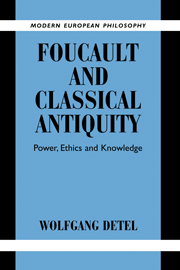1 - Morals, knowledge and power
Summary
According to one influential interpretation, in his later years Foucault turned his attention to the ‘practice of an intellectual freedom’ which ‘goes beyond the modern relationships between will, power and subjectivity’. This reading claims that Foucault's ethics aims to be – at least partly – free of the process of regulation and discipline which the analysis of power had revealed to be the all-pervasive element of the modern age, and maintains that it is concerned with ‘effective resistance to a wide-spread type of power’ and to modern ‘forms of dominance and exploitation’. It is in precisely this sense that Foucault's ethics is supposed to be political, while at the same time it is the last, perhaps even the most important, step in his attempt to subvert psychoanalytically based interpretations of the self, and to demonstrate that they are a form of coercion and political power to which psychoanalysis subjects our desire and our unconscious. Finally, the ethics as a practice of liberation is intended to provide an aesthetics of existence ‘which resists the science of life’ and ‘frees us from the empire of scientific knowledge’.
The general direction of this interpretation is quite clear. Foucault's opposition to universal anthropological, moral and rationalist categories has reaped criticism from influential authors such as Charles Taylor and Jürgen Habermas, who accuse him of abandoning all critical potential, with the result that he is unable to appreciate his historical analyses as an integral part of an emancipatory movement.
- Type
- Chapter
- Information
- Foucault and Classical AntiquityPower, Ethics and Knowledge, pp. 6 - 57Publisher: Cambridge University PressPrint publication year: 2005

